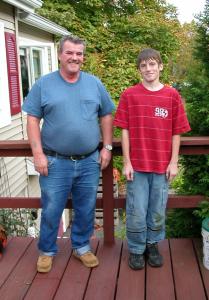Henry Thompson

Finding Friendship Oral History Project
The Finding Friendship Oral History Project is a joint effort of the Friendship Museum and the Friendship Village School, directed by Sally Merrick, museum volunteer, and Gaylea Hynd, teacher. In 2003-2004 sixth grade students conducted taped interviews of three generations of lobstermen and women, as well as others associated with the lobstering industry. Printed copies of the interviews and CDs of the printed transcripts are available at the Friendship Museum in Friendship, Maine.
Caleb
Sally Merrick
Henry Thompson, Sr., born on October 7, 1947, has been a lifelong resident of Friendship, Maine. His family has deep roots in the community, spanning three generations. Henry is a father of two children and a grandfather to eight grandchildren. For ten years, Henry worked as a lobster buyer, purchasing lobsters from local fishermen, before working as a lobsterman. His hobby is metal detecting.
Scope and Content Note
This oral history interview with Henry Thompson, Sr., conducted by Caleb on October 10, 2003, provides insights into Henry's experiences as a lobster fisherman in Friendship, his family's longstanding connection to the area, and his perspectives on various aspects of lobstering. Henry goes out approximately five days a week, primarily fishing from June to December in Penobscot Bay. Henry describes the process of setting traps, including the length of line attached and the use of buoys. He discusses his catch on an average day and recounts his largest lobster, weighing between eight and ten pounds. Henry shares insights into the daily operations on his boat, his responsibilities as captain, and the equipment he utilizes, such as hydraulic haulers and propeller cages. He also addresses topics such as lobster size regulations, the significance of v-notched tails, fines for violations, and the presence of other marine life in his traps. The interview concludes with Henry's thoughts on the joys of lobstering, including the freedom and independence it offers, as well as the challenges, such as the labor-intensive process of retrieving traps in the fall. Although Henry himself doesn't eat lobster frequently, he acknowledges his wife's fondness for it and ensures she enjoys the catch.
Please Note: The oral histories in this collection are protected by copyright and have been created for educational, research and personal use as described by the Fair Use Doctrine in the U.S. Copyright law. Please reach out Voices@noaa.gov to let us know how these interviews are being used in your research, project, exhibit, etc. The Voices staff can help provide other useful resources related to your inquiry.
The NOAA mission is to understand and predict changes in climate, weather, oceans, and coasts, to share that knowledge and information with others, and to conserve and manage coastal and marine ecosystems and resources. The Voices Oral History Archives offers public access to a wide range of accounts, including historical materials that are products of their particular times, and may contain offensive language or negative stereotypes.
Voices Oral History Archives does not verify the accuracy of materials submitted to us. The opinions expressed in the interviews are those of the interviewee only. The interviews here have been made available to the public only after the interviewer has confirmed that they have obtained consent.
